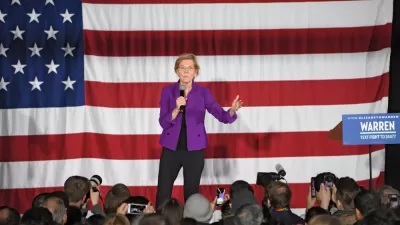A new paper by the People's Policy Project explains why and how a government-owned municipal housing development, i.e., social housing, can address the nation's housing affordability crisis.

Peter Gowan and Ryan Cooper pitch a program of government-owned municipal housing development, which they argue would address the need to increase the number of affordable dwellings in high cost cities in the United States. "Unlike traditional American public housing, all city residents will be eligible to live there," according to Gowan and Cooper.
The article's case for what it calls social housing begins by touting its ability to release price pressure and deliver units at scale to meet the needs of more than just the very top of the market. This isn't the "filtering" argument of market urbanists, however—"not only is that an unreliable procedure (many very old buildings remain expensive), it will take decades to happen."
The second line of argument is that "by allowing people of all incomes to apply to live in these new developments, local governments will be able to charge higher rents to higher-income residents, and thus capture a great deal of capital income."
According to Gowan and Cooper, such a housing policy would only be innovative in the United States. Sweden, Finland, and Austria are referenced. Sweden is also cited as the benchmark for a goal by the United States: "We suggest that 10 million new municipal housing units would be a viable 10-year goal. That is well short of a scaled-up version of the Swedish program, but still quite aggressive. We do not anticipate a U.S. affordable housing oversupply being a significant risk in the medium term."
The article concludes with more details about how a municipal housing program could work in the United States.
The study by Gowan and Cooper has been picked up by multiple media outlets, like The Guardian and Jacobin.
FULL STORY: A Plan to Solve the Housing Crisis Through Social Housing

Trump Administration Could Effectively End Housing Voucher Program
Federal officials are eyeing major cuts to the Section 8 program that helps millions of low-income households pay rent.

Planetizen Federal Action Tracker
A weekly monitor of how Trump’s orders and actions are impacting planners and planning in America.

Canada vs. Kamala: Whose Liberal Housing Platform Comes Out on Top?
As Canada votes for a new Prime Minister, what can America learn from the leading liberal candidate of its neighbor to the north?

Washington State’s Parking Reform Law Could Unlock ‘Countless’ Acres for New Housing
A law that limits how much parking cities can require for residential amd commercial developments could lead to a construction boom.

Wildlife Rebounds After the Eaton Fire
Following the devastation of the Eaton Fire, the return of wildlife and the regrowth of native plants are offering powerful signs of resilience and renewal.

LA to Replace Inglewood Light Rail Project With Bus Shuttles
LA Metro says the change is in response to community engagement and that the new design will be ready before the 2028 Olympic Games.
Urban Design for Planners 1: Software Tools
This six-course series explores essential urban design concepts using open source software and equips planners with the tools they need to participate fully in the urban design process.
Planning for Universal Design
Learn the tools for implementing Universal Design in planning regulations.
Central Transportation Planning Staff/Boston Region MPO
Heyer Gruel & Associates PA
Institute for Housing and Urban Development Studies (IHS)
City of Grandview
Harvard GSD Executive Education
Regional Transportation Commission of Southern Nevada
Toledo-Lucas County Plan Commissions





























